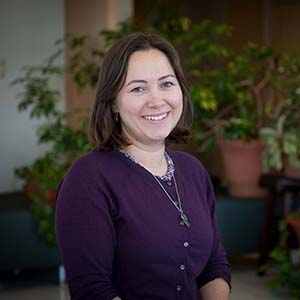
meet our periclean faculty leader
Nurcan Atalan-Helicke
Nurcan Atalan-Helicke is an associate professor in the Environmental Studies and Sciences Program. She is an interdisciplinary social scientist and teaches courses on political ecology, politics of food and human rights, and development. She has worked professionally with nonprofit organizations and a government agency in Turkey and implemented projects related to environmental education, conservation, and rural development.
Her research lies at the intersection of food production and access to clean and healthy food and focuses on the conservation of agricultural biodiversity in Turkey, genetically modified food from an Islamic perspective, and gender dimensions of food consumption. Her research has been published in peer-review journals such as Agriculture and Human Values, Global Environmental Politics, Journal of Environmental Studies and Sciences, Journal of Agriculture, Food Systems and Community Development, Gastronomica, and Sociology of Islam.
She is working on a book project about actors and models that revive wheat varieties domesticated about 10,000 years ago in today’s Turkey.
She has also worked with other faculty who are teaching academic civic engagement courses in the Capital District Region of New York through Campus Community Collaborative. She has also facilitated workshops and presented at academic conferences on teaching academic civic engagement courses.
Course Description
ES 224 Political Ecology is one of the electives that fulfill environmental studies and sciences majors.
In ES 224, students study how humans and their environments mutually shape each other, drawing on political economy and cultural ecology. Students learn about the role of history, institutions, culture, politics, economics, and broader power structures that shape resource use, conservation, and environmental policies.
The course focuses on different case studies, from wolf conservation to e-waste management. These case studies rotate based on student interest and the community project that students work on. Students complete 20 to 30 hours outside of class working with a community organization on an urban political ecology issue.
Over the years, students have worked with different community organizations: Projects with Sustainable Saratoga included climate action, urban forests, affordable housing, urban pollinators, and zero-waste initiatives. Students have also worked with Mohawk Harvest Food Cooperative, Seeds for Peace, and Bikeatoga. Students incorporate and apply their academic training to the project they work on (e.g., in fall 2021, students learned about biking justice and linked it to a project on expansion and perception of bike lanes in Saratoga Springs). Depending on the community needs, students produce different products (e.g., video, report) and can also deliver their findings in an oral presentation to community stakeholders. Students combine their work with reflection journals to assess the role of academic civic engagement in their learning and their relationship and work with the community organization, and they also provide feedback on how these can be improved.